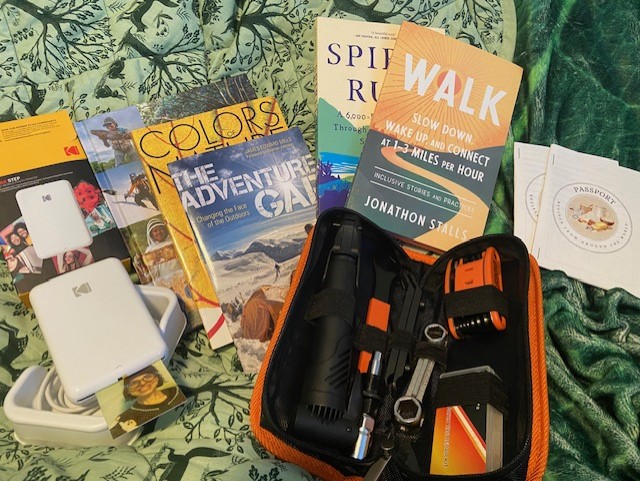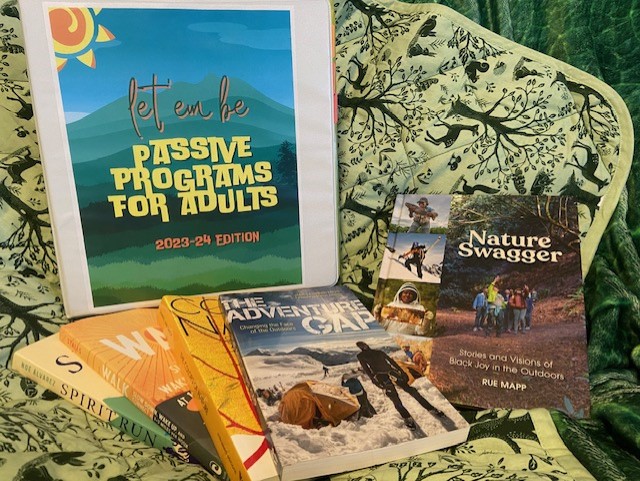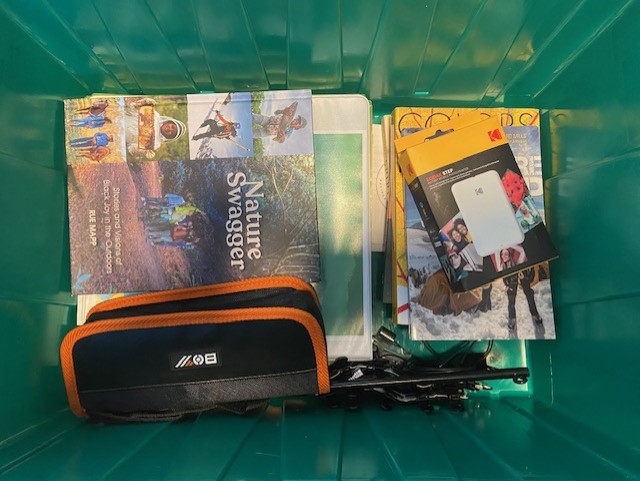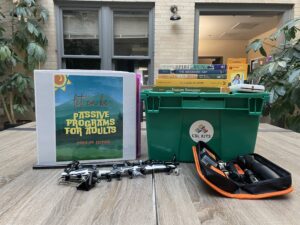The “Let ‘Em Be”: Passive Programs for Adults Mini-Kit was created to support libraries with adult users and visitors to engage adults with activities that can be done on-site or taken to be used elsewhere. This kit is relevant to and available for use all year long, regardless of themed activities or programs. CSL understands that librarians and library workers have a lot to do and creating puzzles or curating passive program materials can take up a lot of time and effort when those are already in such high demand. By providing passive programming materials for adult visitors, we hope to make your lives a little easier and provide your adult visitors something to keep their minds active and have fun while doing it.
While this mini-kit includes puzzles, crafts, games, and other take-home elements that can be placed on a table, it also includes activity suggestions that include recursive elements – that is, elements that cause library users and visitors to interact with staff, collections, or community. You are free to use the included materials alone or in tandem with the suggested engagement activities. (You are also free to create your own engagement activities with the passive programming mini-kit materials.)
The materials included in this mini-kit can be placed in a highly-trafficked area of your library, in silent reading spaces, on tables with a display of books or materials. You know your space best and we believe you can best determine how the tools in here can be used if you decide to use them. Utilization of the materials in this kit engage adult library visitors with little or no staff direction or facilitation, and at little-to-no cost.
The themes of the activities and materials within the “Let ‘Em Be”: Passive Programs for Adults Mini-Kit are community, kindness, and togetherness. This kit was inspired by the 2024 Collaborative Summer Learning Program’s (CSLP) theme: Adventure Begins at the Library. Included adult services facts and reading lists from the CSLP 2024 Adult Manual.
Contents
- Resource Kit binder
- Activities and associated materials
- Adventure Community Collage & Living Book Display
- Passport photo How-to print out
- Kodak Step Wireless Mobile Photo Mini Color Printer (iOS & Android compatible) 2”x3” (Amazon)
- Photo paper (50 sheets) (Amazon) – Consumable, library can use if needed.
- Picture hanging kit (for displaying)
- “Discover Colorado: Bicycle and Scenic Byways Map” (for displaying)
- DIY Bike Repair
- Bicycle Repair Kit
- “Discover Colorado: Bicycle and Scenic Byways Map” (consumable, request from moran_c@cde.state.co.us if needed, replacements available while supplies last)
- Bicycle Manual
- Wild World of Colorado – Coloring Stations
- Colorado Parks and Wildlife coloring pages (in binder and on CPW website)
- Colorado Parks and Wildlife Quick Guides & Passports (consumable, request from moran_c@cde.state.co.us if needed, replacements available while supplies last)
- Every Body Outdoors Reading Adventure
- The Adventure Gap: Changing the Face of the Outdoors, by James Mills
- The Colors of Nature: Culture, Identity, and the Natural World, Edited by Alison Hawthorne Deming and Lauret E. Savoy
- Nature Swagger: Stories and Visions of Black Joy in the Outdoors, by Rue Mapp
- Spirit Run: A 6000-Mile Marathon Through North America’s Stolen Land, by Noé Álvarez
- Walk: Slow Down, Wake Up, and Connect at 1-3 Miles per Hour, by Jonathon Stalls
- Tasting Tour of the Stacks
- Adventure Community Collage & Living Book Display
- 2024 Collaborative Summer Learning Program Adult Manual (modified) including information & facts pages, services to Spanish-speakers information, and adult reading book lists (fiction and nonfiction)
- Additional Resources
- Clipboard with evaluation form to complete (we really want your feedback)



Audience
This mini-kit is intended for adult services librarians and library workers who would like to engage visitors and users with independent, self-determined activities at little-to-no cost.
Activity Links
Contact moran_c@cde.state.co.us if you are looking for something not listed on this page.
Wildlife Discovery coloring pages for all ages by Colorado Parks and Wildlife (print, download)
Information on printing passport photos from the Department of State
Bike Repair Activity
For extending the activity with Bike Month and Bike to Work Day programs, find ideas and resources at:
- Colorado Bike Month on the Colorado Department of Transportation page: https://www.codot.gov/programs/bikeped/information-for-bicyclists/colorado-bike-month/colorado-bike-month.html
- Summer Bike to Work Day: https://www.codot.gov/programs/bikeped/information-for-bicyclists/bike-to-work-day
- Biking through History at the Library, by Noah Lenstra at Programming Librarian https://programminglibrarian.org/blog/biking-through-history-library
- Love to Ride from League of American Bicyclists https://www.lovetoride.net/drivelessbikemore
Every Body Outdoors Activity
- Invite local and Colorado outdoors and adventure groups to visit your library for programming or to partner with your library over the summer of adventure. These partners may include the following:
- Latino Outdoors https://latinooutdoors.org/
- Feminist Bird Club (Denver and the Front Range) https://www.feministbirdclub.org/
- Jonathon Stalls – Intrinsic Paths, Walk, Pedestrian Dignity, etc. https://www.intrinsicpaths.com/ or email directly at jonathon@intrinsicpaths.com
- Blackpackers https://blackpackers.org/
- Birdability https://www.birdability.org/
- Vibe Tribe Adventures https://vibetribeadventures.org/
- Kween Werk – Author of Inclusive Guide https://www.kweenwerk.com/ or visit the Inclusive Guide page https://www.inclusivejourneys.com/
- American Birding Association https://www.aba.org/
Resources
Book: The Passive Programming Playbook
https://www.abc-clio.com/products/a6061p/
(From the publisher)
This book offers 101 passive programming ideas that are extendable, adaptable, customizable, and above all, stealable—so your passive programming never runs dry.
Passive programming is a cheap, quick, fun way to make all library customers feel like part of the community. It can support reading initiatives, foster family engagement, encourage visit frequency, and coax interaction out of library lurkers—while barely making a dent in your programming budget. Passive programming can be targeted at children, teens, adults, or seniors; used to augment existing programs; and executed in places where staff-led programming can’t reach. It can be light-footed, spontaneous, and easily deployed to reflect and respond to current news, media, library events, and even the weather. But even passive programming pros run out of ideas sometimes, and when that happens, they want a fresh, funny source of inspiration.
Blog: Passive Doesn’t Mean Boring
Though this is written by a school librarian with a [likely] intended audience of school librarians, the ideas and examples are ones that can be used in any library that serves a varied and diverse population. Ideas like the jigsaw puzzles and Zentangles (or other similar drawing kit-based activities) can come at a cost, but are typically low-cost and can yield a lot of use and engagement. Bonus for their ability to be used again and again.
News: Reaching Teens Subversively through Passive Programming
https://programminglibrarian.org/articles/reaching-teens-subversively-through-passive-programming
Again the word “teen” is used and the article seems geared toward non-adult users; however (again), the ideas for passive programming (bulleted mid-way through the page) are ones that can be done at any library for any user group. (Some are even included in this mini-kit!)
More Colorado-specific Resources & Ideas: Colorado Parks and Wildlife (CPW) Wildlife Discovery
https://cpw.state.co.us/learn/Pages/TR-WildlifeDiscovery.aspx
This page from our partners at CPW include the adult coloring pages supplied in this kit. In addition, there are resources for education mapped to curriculum and standards for preschool to middle school grades, providing an opportunity to extend the activities for families of children. Links to additional resources are available here as well. CPW also have a trail mapping app called “Colorado Trail Explorer (COTREX)” that can be used on-site at parks https://cpw.state.co.us/CTS/Pages/default.aspx
More Colorado-specific Resources & Ideas: Colorado Bike Month
https://www.codot.gov/programs/bikeped/information-for-bicyclists/colorado-bike-month
From the Colorado Department of Transportation (CDOT), this website contains information prepared by CDOT’s Bike and Pedestrian Programs and the CDOT Library. Resources include a reading list (can be used for programming and book display ideas) and links to the Bike to Work Day event (content updated annually and date re-set to current year’s corresponding calendar date).

